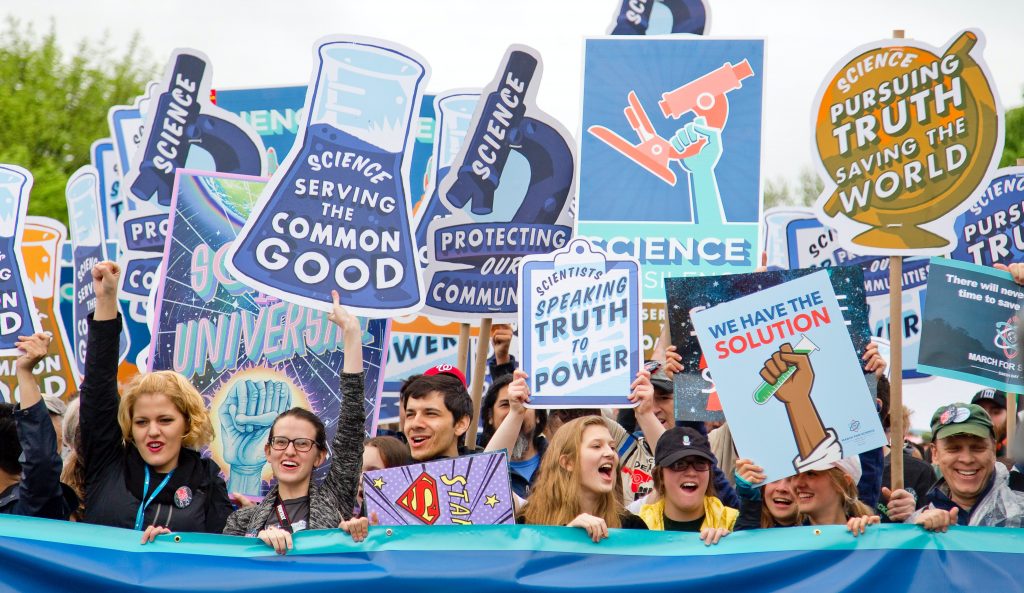
The Secret Social Lives of Science
By Stephen H. Jones

Read enough science journalism and eventually you will become familiar with two tropes that seem to contradict one another. On the one hand, journalists will often write about ‘science’ as though it is an unquestioned authority, with the more opportunistic members of the profession using the term to try to convince us that expensive trainers are bad, Kylie Minogue’s legs are good, and that politicians are competent. The word ‘science’, as the sociologist Thomas F. Gieryn put it, ‘often stands metonymically for credibility, for legitimate knowledge, […] for a trustable reality’.
On the other hand, people from that same professional sphere also write about science as something remote from a public that is uninterested and unfamiliar: the preserve of elite, untrusted experts. This is a familiar refrain among science communicators too, who frequently talk of science being ‘undervalued in our culture’.
Can these two things be true at the same time? One would have thought that the more remote from scientific institutions the public feel themselves to be, and the more the authority of science is weakened by people claiming science recommends you celebrate Christmas early, the more the term itself would lose its power. But it stubbornly retains its authority, even if we do see bitter contests over its meaning and limits. Perhaps, then, to assume this is to misunderstand the way ‘science’ is embedded in our culture and the meanings that people invest in the term.
One way of interrogating this is to look at what people understand science to mean. By this, I don’t mean asking people to define what ‘science’ is. Rather, I am interested in if, and why, people see science as meaningful. Over the last few years, I and my colleagues interviewed British and Canadian adults on this theme, exploring not just why people are interested in science, but how some identify with it: those people who, for one reason or another, see science as giving meaning to a part of their lives.
This doesn’t apply to all people, of course. Although no one we interviewed – even the most fervent creationist – saw themselves as against ‘science’ per se, only a minority of our interviewees identified with science in any sense. But we did find four types of identification that can help us understand the social lives of science.
Science: It’s what I’m good at
Much of the time we think of science as a profession and practice, and that is how many of the people interviewed saw it – especially, you may be unsurprised to learn, our scientist interviewees. Those involved in scientific research tended to see meaning in their superior knowledge of science and their proficiency in conducting scientific research. (‘I’m a duck and there’s water’, as one biologist expressed it.) Science, for these scientists, was a fundamental part of their self-image as capable people.
That, of course, is unsurprising. What was more surprising was how among our non-scientist interviewees this ‘practical identification’ (as we termed it) combined with working class identities. Some of the people we interviewed who worked in technical professions, used this image of science as something one does to contrast themselves with their university educated peers. These individuals – like Norman, a retired technician living in the north of England – would playfully refer to their own lack of education (‘I’m not the brightest button in the box’) and took great pleasure in knowing more about science because of their work in industry than friends who ‘wouldn’t have the foggiest’.
Science: Teaching you to think for yourself
These people contrasted with others we spoke to who saw science in more moral terms, as providing norms by which to live a good life. This second group equated ‘science’ with a willingness to discover for oneself, respond to evidence and debate openly. They were almost exclusively non-religious and tended to compare thinking ‘scientifically’ – that is, for oneself – with ‘a faith-based approach to things’. As Rebecca, an English agnostic, said: ‘[Science] becomes set into my values and beliefs and things rather than just, “It says it in the news” or “it says it in a paper” […]. I take that in myself’.
One should not assume, though, that such personal alignment with ‘science’ stems from high levels of science knowledge. There was, at best, limited evidence among our interviewees to suggest that was the case. Indeed, we even met people whose emphasis on science as independent self-discovery had led them to rely on alternative therapies such as homeopathy. ‘Science’, for these people, was not a body of ideas so much as a placeholder for a liberal, individualistic moral framework.
Science: Because we don’t want to go back to the dark ages
Something similar can be said about another form of science identification we encountered in which ‘science’ stood at the heart of a narrative of civilisational advancement. These people spoke of science as under threat from medieval superstitions and saw it as a bulwark against the weakening of ‘Western culture’ by ‘postmodern’ relativism and immigration.
This identification, again, was exclusively non-religious and usually anti-religious. It also bore no relation to a person’s science knowledge. (The scientists we spoke to were far less likely to adopt this outlook than members of the public.) It was shaped instead by a distinctive constellation of media and political influences: ‘New Atheist’ intellectuals like Christopher Hitchens and Richard Dawkins or sceptics such as Penn Jillete and James Randi. These coalesced into a libertarian or conservative – rather than liberal – stance, one focused not on enquiry and choice but defence of a singular conception of truth. This truth was routinely characterised as under threat, and concerningly, this threat was almost always Muslim: ‘the danger’, as one put it, ‘is coming from Islam’.
Science: A window onto what the universe is all about
A less negative reading of science was offered by a fourth group. This group placed emphasis on science in a narrative about ultimate meaning. Sometimes – in most cases, in fact – this narrative involved God or some other deity, with people like Mickey, a chemical engineer, speaking about how he would ‘stand amazed that [a chemical reaction] happens and that has to be some creator, who’s done this’. Science offered a window into deeper meaning or – in the case of Justine, a UK-based convert to Islam – confirmation of a theistic perspective: ‘[S]cience, […] for me, it proves religion is real’.
Existential conceptions of science were less common in our interviews with non-religious individuals. When they did appear, however, they were much stronger. For our religious participants, what mattered was faith in Jesus or in some other person or text that mapped the ultimate destiny of humankind; ‘science’ merely supported that worldview. For the non-religious individuals who involved science in their account of ultimate meaning science was fundamental: instead of supporting a worldview, science was the worldview itself. Science enabled a quasi-spiritual ‘connection’ with nature or, in the words of Carl, ‘an evolutionary staircase […] which is cosmic in scope’.
Science, Identity and Public Communication
Reviewing these descriptions of what science means to people it is possible to get a window into why public discourse about science can seem so contradictory. Those who claim that science is ‘undervalued in our culture’ appear both right and wrong at the same time. ‘Science’ clearly does permeate into our culture, even to the extent that individuals use it to burnish narratives about who they are and why their loyalties and concerns matter. People can often see the term as fundamental to their class, cultural, political and religious identities. This is especially the case for certain groups, with those identifying as non-religious aligning themselves with the concept most clearly.
Yet this isn’t to say that people who raise the alarm about the public lacking trust in scientific institutions are (always) wrong. The meanings that the wider public ascribes to ‘science’ often have very little to do with scientific institutions and the research that they carry out. People who identify strongly with science, do not necessarily do so because of their science knowledge. ‘Science’, in their narratives, may be turned into something more: a set of moral norms, a civilization under threat, a system of meaning.
Perhaps the problem for those concerned with the public’s acceptance of, and engagement with, science is that they must contend with these different, and sometimes competing, worlds of meaning. Should those interested in science communication seek to tap into these popular moral, civilisational or existential narratives about science, or remain strictly limited to the (dull and dry) work scientific institutions do? The popularity of science programming that takes the form of a ‘humanist blockbuster’ suggests there is much to be gained from doing so. But then, one should also remember that the claims made upon science by certain social groups is often based on the exclusion of others, people – Muslims, in our interviews – marked as different, irrational and ‘anti-science’.

Stephen H. Jones is a a sociologist of religion specialising in the study of Islam and Muslims in the UK and religious and non-religious publics’ perceptions of science. He is a Lecturer at the University of Birmingham and General Secretary of the Muslims in Britain Research Network. He writes here in a personal capacity. For more see his Research Profile.
Follow Stephen on Twitter: @StphnHwrdJns
